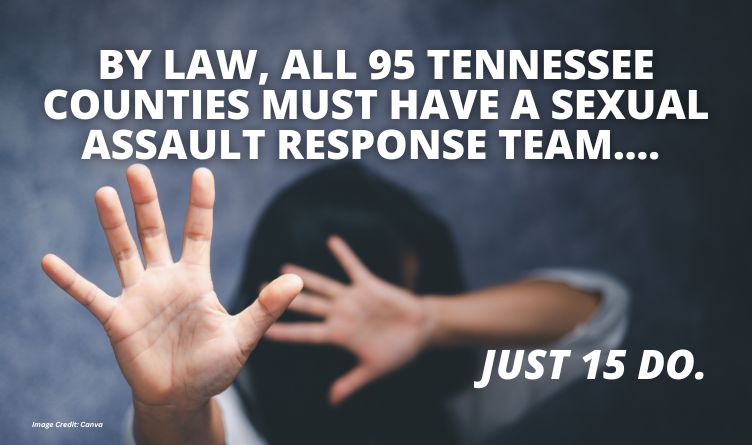The measure passed by the legislature in 2023 includes no accountability for law enforcement agencies that don’t comply.
Image Credit: Canva
By Anita Wadhwani [The Tennessee Lookout -CC BY-NC-ND 4.0] –
More than a year after lawmakers passed legislation to prod local law enforcement into establishing trained sexual assault response teams, just 15 of Tennessee’s 95 counties have one in place.
In wide swaths of Tennessee, victims are still encountering untrained personnel in police and sheriffs’ departments, district attorneys offices and emergency rooms —and an often confusing-to-navigate maze of public and private services.

The executive director for the Tennessee Coalition to End Domestic and Sexual Violence, Jennifer Escue, said that in some Tennessee counties, tensions between law enforcement and advocates have prevented the kind of collaborative team response to sexual violence the law is intended to foster. The lack of coordinated response can result in fewer prosecutions of perpetrators and poorer outcomes for victims, she said.
The Sexual Response Team Act was enacted with bipartisan support in 2023.
It set a deadline of January 1 this year for each law enforcement agency in the state to establish so-called SART teams — multidisciplinary groups of professionals involved in all aspects of responding to sexual assault, including nonprofit advocates, law enforcement, prosecutors, mental health providers and hospitals.
SART teams have been set up across the country to guide survivors through what can be a confusing and frightening criminal justice system, identify gaps in services and train first responders.
The teams typically meet regularly to design comprehensive plans intended to provide survivors support and access to justice, while minimizing the potential for re-traumatization.
Tennessee’s law, cosponsored by Sen. Becky Massey and Rep. Elaine Davis — both Knoxville Republicans — included no state funding for local SART teams, even as state fiscal experts estimated the measure could cost local governments in Tennessee a collective $20 million annually.
The final version of the law also included no accountability for law enforcement agencies that do not comply.
Originally, the measure required law enforcement to report they had established the SART teams to the Tennessee Bureau of Investigation.
That provision was stripped from the bill as it made its way through the legislative process. Currently, no state agency is in charge of keeping tabs on whether law enforcement agencies have established SART teams in their jurisdictions.

Massey said in a phone interview Wednesday she had not heard concerns about spotty implementation of the law but was prepared to meet with advocates ahead of the next legislative session to consider additional legislation.
“Whether it’s something that needs to be strengthened or whether we just need to remind people about it, I don’t know,” she said. “That may be what’s happening in some of our smaller counties. They may just need to be reminded.”
Escue said her agency by default, has been left to keep track of which counties have SART teams in operation, and calls the 15 teams they have accounted for a “moving target.” No law enforcement agency is required to reports its progress on creating a SART team to Escue’s organization.
Escue and other advocates say they are hoping to impose more accountability on local law enforcement when the legislature reconvenes in January.
Rachel Freeman, president and CEO of the Sexual Assault Center in Nashville, said a priority is funding. The state has funded child protective investigative teams and domestic violence coordinating councils that similarly collaborate in local teams to address child abuse and domestic violence, she noted.
“There is funding behind those so that the coordination is housed somewhere, making them more effective. I think we will need to explore a similar model for SARTs to be more effective and active as well,” she said.
According to the Tennessee Coalition to End Domestic and Sexual Violence, counties that have established sexual assault response teams include:
Coffee
Davidson
Hamilton
Hawkins
Henry
Madison
Maury
McMinn
Putnam
Rutherford
Scott
Shelby
Sullivan
Warren
Washington



